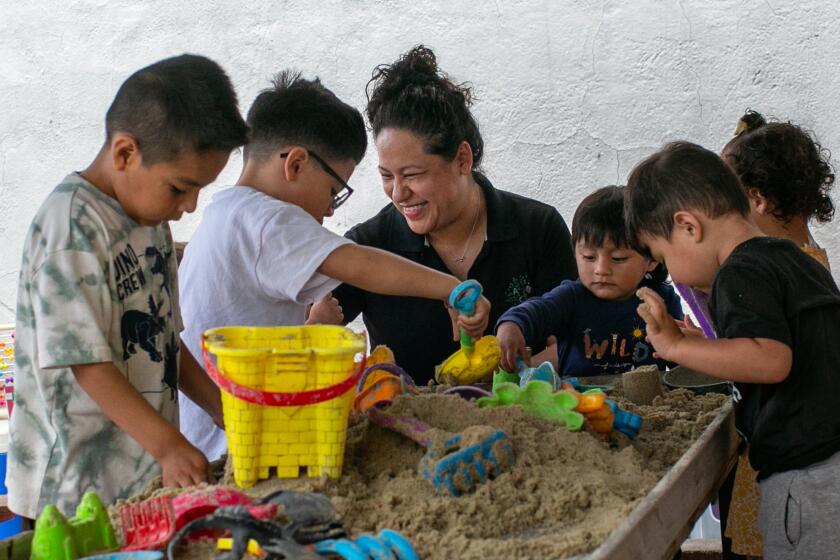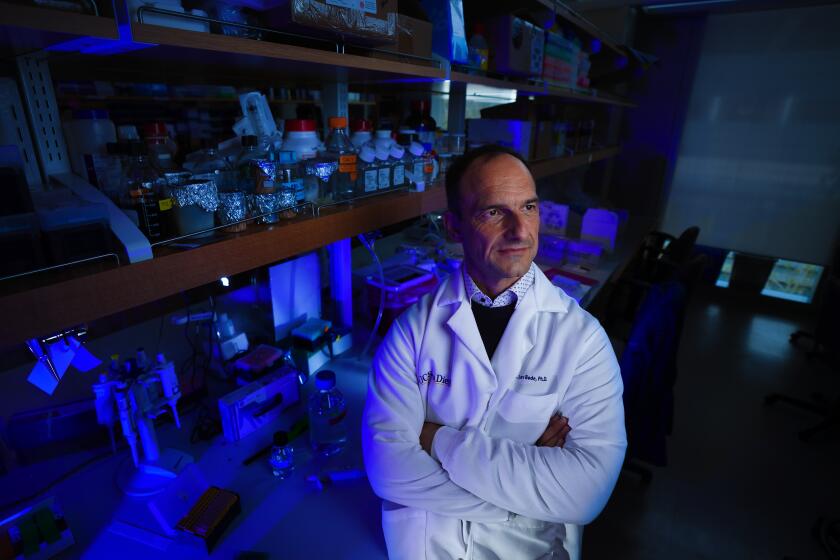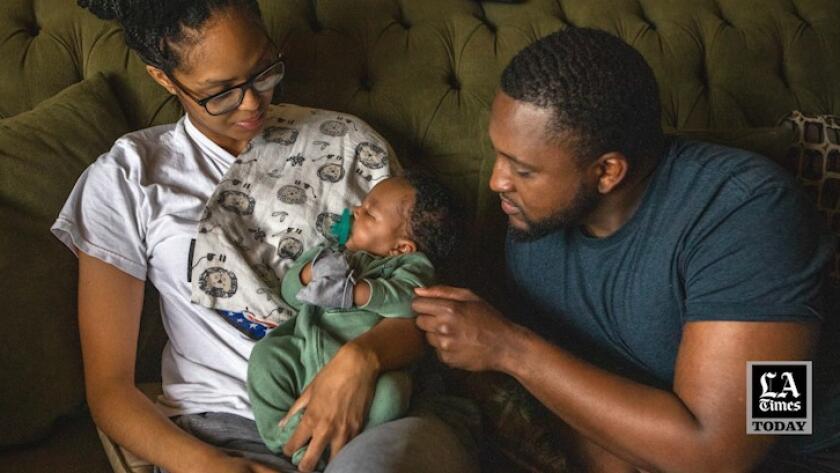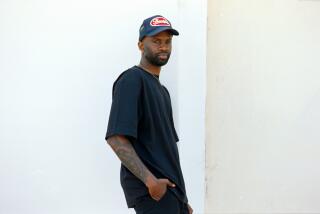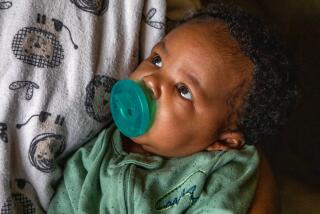Breasts are made for feeding. New dads play a key role in successful nursing, safe sleep
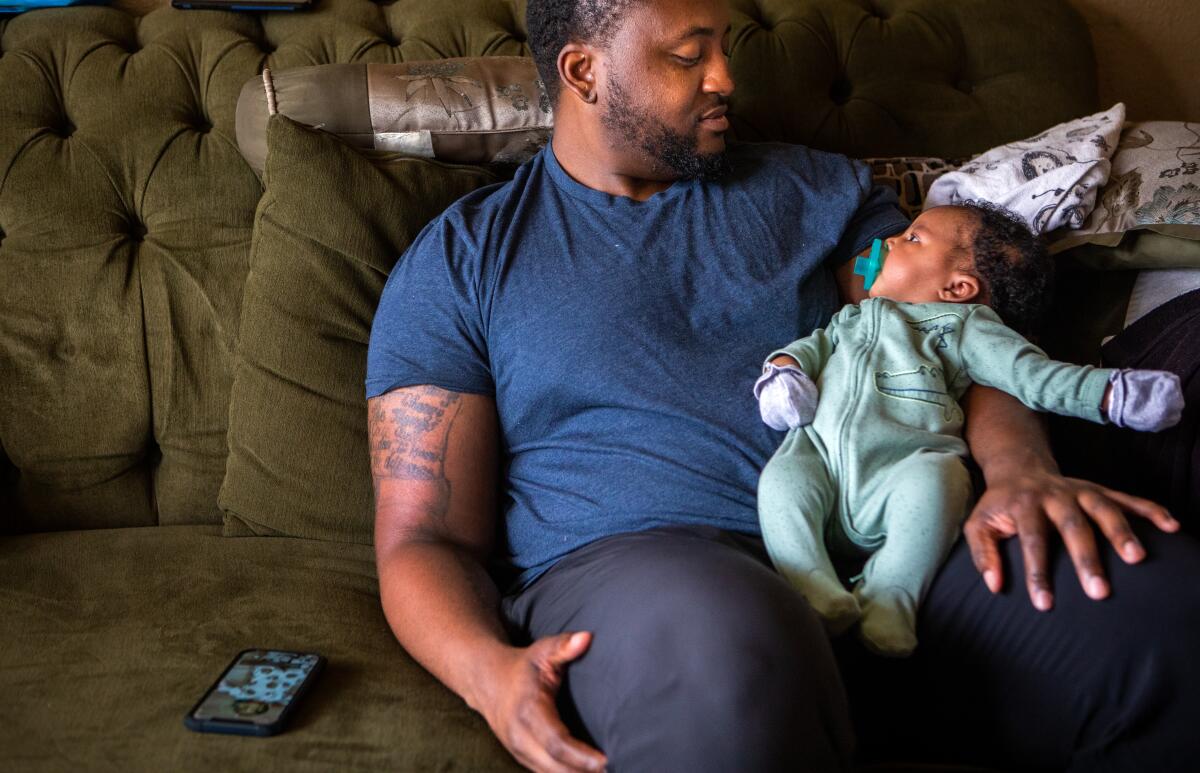
- Share via
Danny Rollins of Compton became a dad just one month ago, when his son Braylen was born. “I can’t take my eyes off of him. I love being around him and holding him,” he said. “It’s really a beautiful thing right now.”
Rollins, 32, is taking two months off from his job as a barber to be with his new family, but he’s still hard at work. “I’m security, chef, taxi driver. I clean. I’ve been mainly the one doing the cooking.”
But one of his most important roles is being part of his infant’s breastfeeding team. When his wife is nursing, he brings her snacks and water, gets the breast pump ready for her after she nurses, and then stores the milk. “Breastfeeding is hard work and it’s tiring,” he said. “I knew I would have to step up and make sure she had everything she needs.”
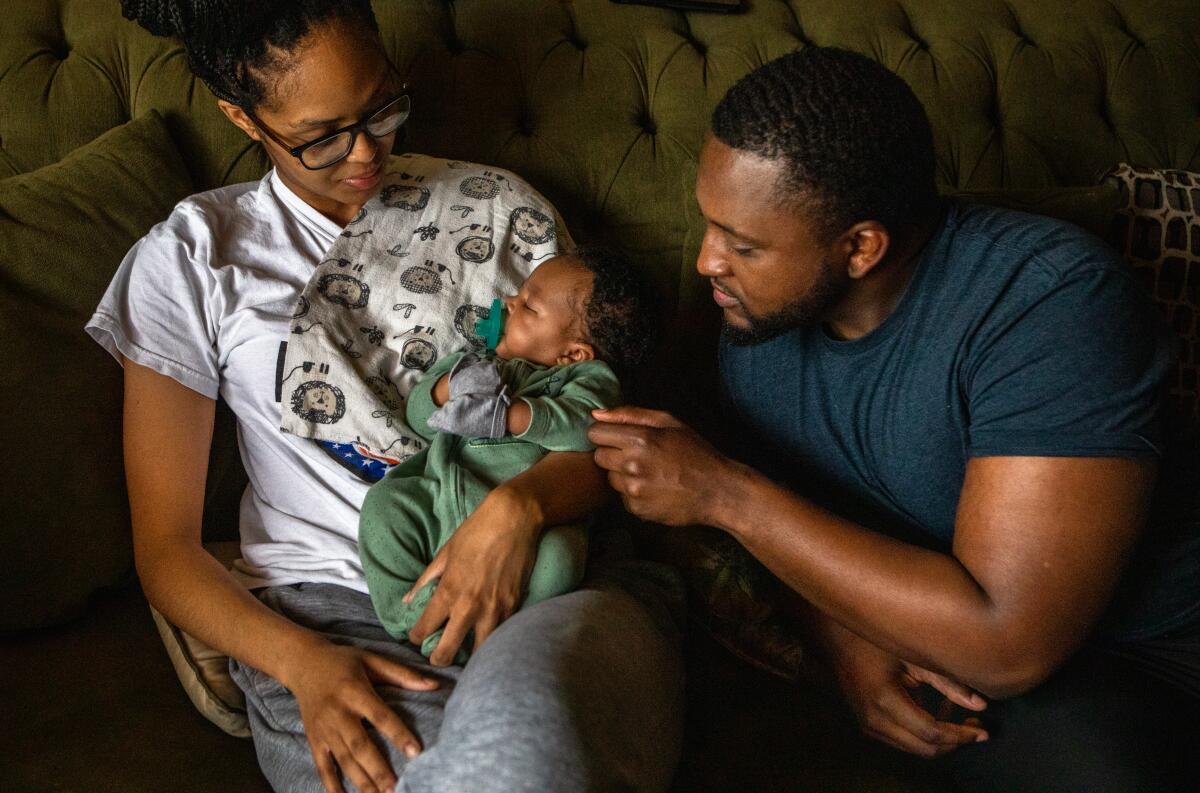
A supportive dad like Rollins can make a big difference in whether a baby is successfully breastfed, according to a recent study about new fathers published Friday in Pediatrics, a journal of the American Academy of Pediatrics. The study also found that dads are key to making sure babies are put to bed in a safe sleep environment.
Among the two-thirds of fathers who reported that they wanted their infant’s mother to breastfeed, 95% of their babies started breastfeeding, and 78% were still nursing by eight weeks. That was significantly more than for fathers who said they didn’t want their infants to breastfeed or had no opinion — 69% of those babies started out breastfeeding, and just 33% were still breastfeeding by eight weeks.
More on safe sleep
“I absolutely have heard dads not be supportive of breastfeeding,” said Asaiah Harville, an international board certified lactation consultant who works with families in Southern California. “There’s a sense of breasts being only there for sexual pleasure and the baby is just getting in the way of what the dad thinks his needs are.”
Harville said the best way to change that perception is to involve the fathers in breastfeeding from the beginning. “If I’m teaching a prenatal breastfeeding class, I highly encourage dads to show up.”
A worrisome revelation in the study was that few fathers were putting their babies to sleep safely — an issue drawing concern in Los Angeles County, where the number of infant suffocation deaths has risen in recent years.
While almost all of the fathers who responded to the survey said they put their babies to sleep, just 16% said that they usually followed three of the safe sleep guidelines recommended by pediatricians to prevent sudden unexplained infant death (SUID). The guidelines call for placing the baby to sleep on their back, using an approved sleep surface such as a crib or bassinet, and avoiding all soft bedding, including blankets, pillows and crib bumpers. Only 32% of fathers said they used an approved sleep surface.
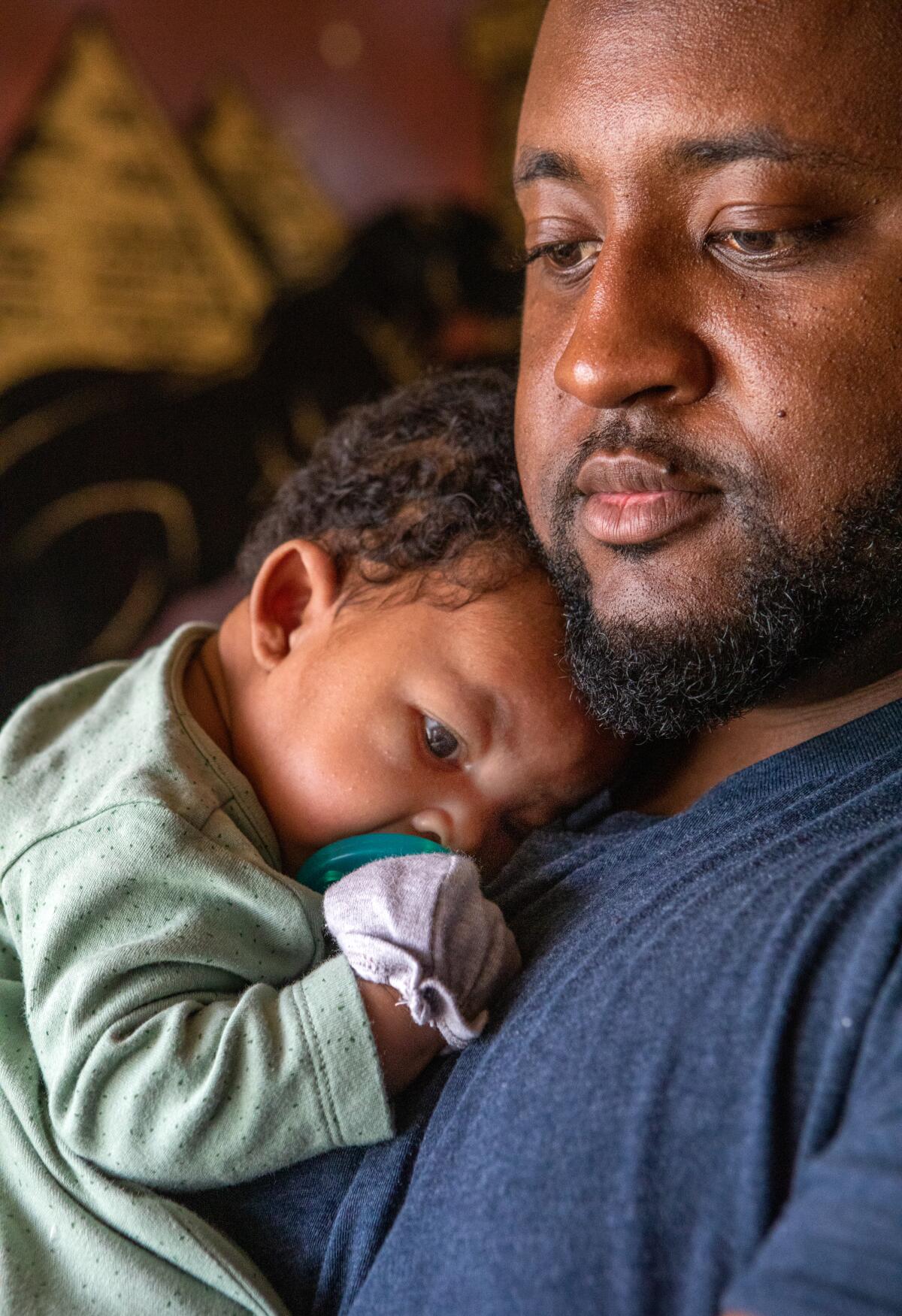
Each year, there are about 3,400 sudden unexpected infant deaths in the U.S., including babies who die of Sudden Infant Death Syndrome (SIDS) and accidental suffocation in bed.
In Los Angeles County alone, a baby suffocates nearly every week while sleeping, according to the infant safe sleep campaign from the Inter-Agency Council on Child Abuse and Neglect.
The Pediatrics study, which was led by scientists at Northwestern University and Ann & Robert H. Lurie Children’s Hospital of Chicago, surveyed 250 fathers in Georgia two to six months after their baby was born. The questionnaire is meant to be a companion to a long-running and widely respected survey used to collect data about new mothers.
As child-care workers struggle to pay bills, in-home providers push for higher wages and urge the state to overhaul rates for its subsidized care program.
“It surprised me how low [safe sleep compliance] was, especially as a provider talking to patients all the time,” said lead study author Dr. John James Parker, an instructor of pediatrics at Northwestern University Feinberg School of Medicine. When he explains the principles of safe sleep, he said, “most of them nod their heads and say that’s what they’re doing. But in reality they must be nodding but there’s a blanket in the crib or the baby is spending some of their time sleeping on a mattress with the parents.”
And it isn’t just fathers; surveys given to new mothers have found that their compliance with the safe sleep guidelines is similarly low.
Of the fathers who responded to the survey, nearly a third said they had not received information about at least one of the safe sleep guidelines. Fathers who did receive appropriate information about safe sleep, however, did not appear more likely to follow the guidelines.
Still, Parker said the recent survey of fathers indicates that they are an important target of information about safe infant care, especially Black fathers, who reported they were less likely to use the back sleep position and more likely to use soft bedding than white fathers. Nationally, the rate of sudden unexpected infant death of Black infants is more than twice that of white infants.
Over the last 50 years, fathers have tripled the amount of time they spend caring for their children. A growing body of research finds that the children of more involved dads are healthier. But Parker said that healthcare providers often are not doing enough to engage fathers in the hospital or at the baby’s well visits.
UC San Diego is formally inaugurating the Human Milk Institute, the first academic institution in the U.S. devoted to a crucial element of human nutrition.
“Fathers are often packing up the babies and leaving to get the car and trying to be helpful, but providers need to make sure they have the eye contact and they’re paying attention,” he said. “I want fathers to think of themselves as equal parents and know that their role is extremely important in the growth and development of their family.”
The first safe sleep campaigns began in the mid-1990s, with public service announcements on TV and “Back to Sleep” messages printed on rice cereal boxes. The American Academy of Pediatrics updates recommendations every few years, and messaging is still prolific today. “Back is Best” is sometimes embroidered on infant sleep sacks to remind parents of the importance of putting their babies to sleep in a safe position.
In Los Angeles County, the inter-agency council’s safe sleep campaign distributes posters and brochures for hospitals to give to new parents, said Deanne Tilton Durfee, the agency’s executive director. Most of the messaging has focused on mothers as the target audience.
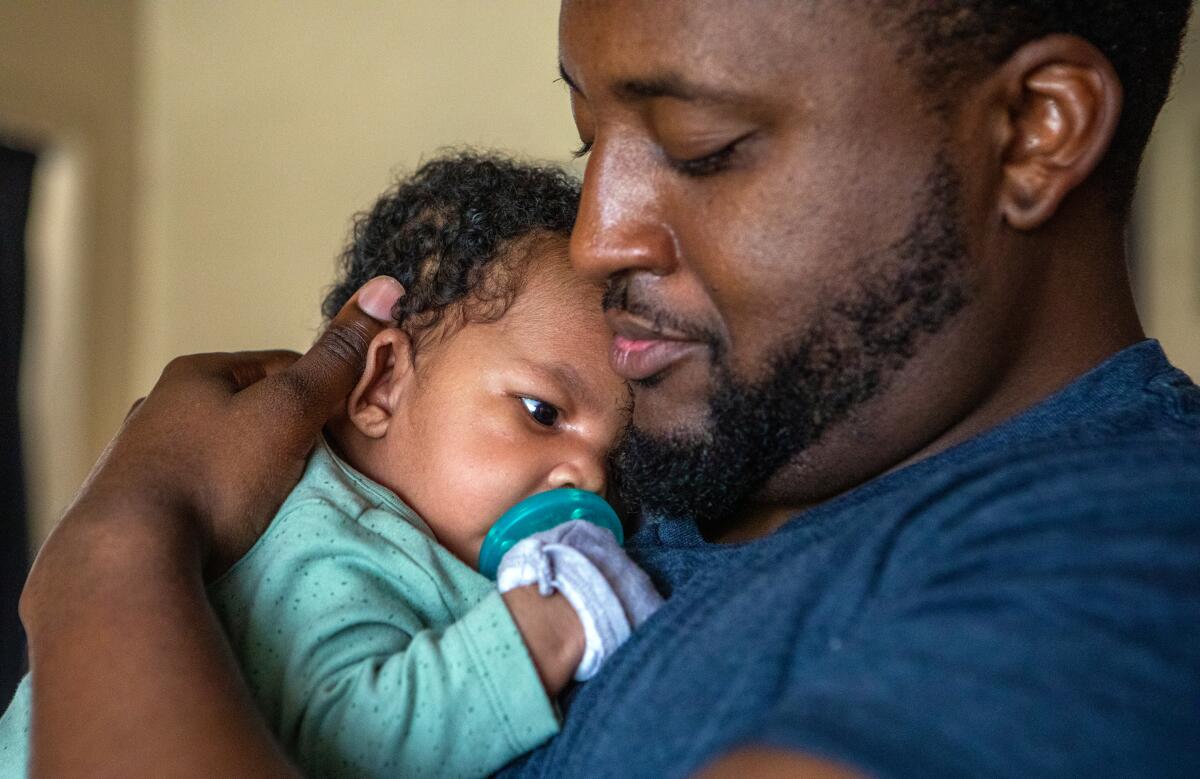
Its last major safe sleep push from 2012 to 2014 successfully brought the number of infant suffocation deaths from a high of 70 per year in 2011 down to 34 by 2014. But the number is creeping up again, she said, to 44 deaths in 2022. This year, Durfee said, the number is on track to be even higher.
“We need to get back out there with the messaging more intensively. Families with new babies are exhausted, they’re challenged, they’re just not thinking. And maybe we need to revitalize the messaging.”
New dad Danny Rollins gained much of his knowledge about fatherhood, including safe sleep and breastfeeding support, from the Expecting Fathers Group, part of the Los Angeles County Department of Public Health’s African American Infant and Maternal Mortality Initiative.
Davion Mauldin, the initiative’s fatherhood coordinator, meets weekly with groups of fathers-to-be, teaching them how to advocate for their partners and about basic infant care. He emphasizes the value of breastfeeding and encourages them to be active participants in conversations with lactation specialists. He even offers techniques for how to position the infant, help massage the milk down and give comfort if the mother is experiencing pain, such as applying ice.
Mauldin says he wasn’t surprised to learn that many fathers surveyed weren’t following the safe sleep guidelines, because often the information isn’t reaching them. “We don’t know what we don’t know.”
“The promotion across the board needs to be better. There’s a lot of information out there and a lot of programs. What we need improvement on is to make sure we’re getting the information in the right spaces and to the people who need it,” he said.
This article is part of The Times’ early childhood education initiative, focusing on the learning and development of California children, from birth to age 5. For more information about the initiative and its philanthropic funders, go to latimes.com/earlyed.
- Share via
Watch L.A. Times Today at 7 p.m. on Spectrum News 1 on Channel 1 or live stream on the Spectrum News App. Palos Verdes Peninsula and Orange County viewers can watch on Cox Systems on channel 99.
More to Read
Sign up for Essential California
The most important California stories and recommendations in your inbox every morning.
You may occasionally receive promotional content from the Los Angeles Times.
